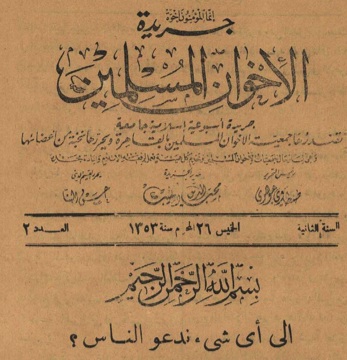(1).jpg)
FROM PRISON TO THE PRESIDENTIAL PALACE: THE MUSLIM BROTHERHOOD
Egypt, once an Ottoman land, was occupied by the British in 1882 and annexed in 1914. The new masters left the family of Muhammad Ali of Kavala, who had held the privileged status of governor since 1805, in charge. However, Abbas Hilmi Pasha, who was opposed to the British, was dismissed, and in his place Fuad was declared king, as he had promised obedience to the British and harbored hostility toward the Ottomans. When Fuad died in 1936, his 16-year-old son Farouk succeeded him. Farouk was well-intentioned but weak-willed. The king’s and his entourage’s extravagance bordering on debauchery, endless scandals, and on the other hand the pressure of the British, exhausted the people, who were living in misery. Islamic life had weakened; with the reforms spearheaded by Abduh, who had been appointed mufti by the British, the historic al-Azhar University was reduced to the level of a high school. As the late Ottomans would put it: “Egypt had long since been Westernized.” It was precisely in this environment that the Muslim Brotherhood was born and grew. Over time, it extended branches to the entire Islamic world.
.jpg)

The Wave of Socialism
The Muslim Brotherhood was founded in 1928 in the city of Ismailia. Its founder was Hassan al-Banna (1904–1949), a teacher and son of a peasant. The misery of the workers employed in the Suez Company inclined Banna toward socialist ideas. He was also influenced by the reformist ideas of Abduh and Rashid Rida, who advocated for ittihad al-Islam (unity of Islam). The society, which took its name from the journal al-Ikhwan al-Muslimin published by Banna, moved to Cairo in 1932. It spread under the patronage of Tantawi Jawhari, a scholar of al-Azhar. It gained fame by writing advisory letters to the king and other Muslim rulers, urging them to observe Islamic principles meticulously in political and social life. Money was collected from the people who warmly welcomed the movement. Militia forces were organized among the youth under the guise of scouting.
The Brotherhood participated in the 1941 elections won by the secular Wafd Party; it did not enter parliament but increased its reputation. It pursued legal and illegal struggle in parallel. For this reason, in 1944 the organization was dissolved and its assets confiscated. Hassan al-Banna and his companions were arrested on charges of being responsible for the death of former prime minister Ahmed Mahir, but were released for lack of evidence. Meanwhile, the society participated in the 1948 Palestine War. At the same time, it waged guerrilla warfare against the British. That same year, the pro-British Prime Minister Mahmud Fahmi al-Nuqrashi was assassinated. The Brotherhood claimed responsibility for this act. Twenty days later, Hassan al-Banna was assassinated. The movement held the king responsible for this assassination, but the British were likely involved.

Trust in the Officers?
In 1950, the Constitutional Court declared that the ruling against the Brotherhood was wrong. Prime Minister Nahhas Pasha granted freedom to the organization. But the Brotherhood had formed an alliance with the Free Officers within the army, who were preparing to overthrow the king. These two movements, though very different in worldview, found common ground in socialism. The officers also promised that once they came to power, they would establish an Islamic state. The Brotherhood persuaded the people and worked for them. Thus King Farouk was deposed in 1952. In his memoirs, the king wrote: “Those who deposed me were the Muslim Brotherhood. The officers were nothing but a tool in their hands.”
.jpg)
The Brotherhood called upon coup leader Nasser to fulfill his promise, but Socialist Nasser had no such intention. The first act of the officers was to ban the fez. What’s more, when they signed an agreement with the British in 1954, their ties with the Brotherhood were severed.
The Brotherhood brought people into the streets. Nasser, who survived an assassination attempt, persuaded Abdul Quadir 'Oudah (1907–1954), one of the Brotherhood leaders, to suppress the uprising. The hadith “Whoever helps an oppressor, Allah will set him against him” came true. Immediately afterwards, 10,000 members of the movement were arrested on charges of assassination and subjected to torture. 'Oudah, a sensible scholar and jurist who had served in the drafting of the Egyptian constitution and had earned a reward from King Fuad with his famous book on Islamic Criminal Law, was hanged together with five of his companions. Bringing socialist oppressors to power was an unforgivable mistake of the Brotherhood, which lacked political experience and foresight. Despite all its negative aspects, the monarchy was, in terms of freedoms, the most suitable regime for Egypt; British presence served as a safeguard against Soviet Russia.
(1).jpg)
, Nasir ile bir sofrada.jpg)
Sayyid Qutb
Among those imprisoned was an educator named Sayyid Qutb (1906–1966). In his youth, Qutb admired Western culture, but under the influence of Abul A‘la Maududi, the Pakistani founder of Jamaat-e-Islami, he turned toward the Islamic movement. At that time, as a reaction to America’s support for Israel, Russia and socialism were popular in the Arab world. Because his religious culture was weak, Qutb was drawn to this trend. Having gone to America to study sociology, he returned to his homeland hostile to it and joined the Brotherhood in 1950. He wrote fiery articles in the newspapers. In his view, all problems could be solved by returning Islam to the purity of its first century.
.jpg)
%20hapiste.jpg)
Sayyid Qutb was sentenced to 15 years in prison. This pushed him into an even more marginal position, to the point that he clashed with the Brotherhood, which was seeking reconciliation with the regime. The torture inflicted on the Brotherhood caused a reaction in the Arab world. At the request of Iraqi President Abd al-Salam Arif, Sayyid Qutb was released in 1965. But when it was seen that he was continuing on his path, he was arrested and in 1966 executed together with two of his companions. However, the books he wrote in prison, which recommended jihad by any means to escape from the modern order he described as “Jahiliyya” (ignorance, the pre-Islamic state), spread throughout the world.
The Brotherhood Conforms to the System
After Nasser’s death (1970), the society breathed easier. Anwar al-Sadat, under the influence of America, which wanted to eliminate leftist groups, granted freedom to the Brotherhood. On the condition that they refrain from violence, he allowed them to engage in political activity. In response, supporters of Sayyid Qutb accused the Brotherhood of treason and turned to other radical organizations such as Takfir and Islamic Jihad.

When Anwar Sadat was assassinated in 1981 by Islamic Jihad, his successor Husni Mubarak tried to get along with the society. But when the Brotherhood increased its votes and seats by allying with other parties in elections, Mubarak, alarmed, tried to curb it. Using as a pretext the terrorist activities of radical groups who opposed his pro-American stance in the 1991 Gulf War, the government arrested hundreds of Brotherhood members. In the 1995 elections, the government expelled the only deputy they managed to send into parliament. It also tried to prevent their participation in the 2000 elections. Nevertheless, they succeeded in sending 17 deputies into the 454-seat parliament. With the collapse of communism, the Brotherhood adopted a more liberal and democratic line. In the 2005 elections, they won 88 deputies and became the second largest group after Mubarak’s party. This increased both their prestige and their enemies. Now the Muslim Brotherhood was at the head of Egypt. Why the military council tolerated this at all costs is unknown. But it was not without similarity to Turgut Özal’s rise in Türkiye after the September 12 coup.
.jpg)
The Brotherhood of Syria
Not only in Egypt, but in almost all Arab countries—especially Syria and Iraq—the Ikhwan al-Muslimin movement arose, which, even if not organically connected, belonged to the same ideology. Among these, the society in Syria, headed by the famous hadith scholar Mustafa al-Siba‘i (1915–1964), was known for its closeness to a conservative and Sunni line. After the coup attempt in 1981, the Syrian Brotherhood was virtually annihilated by the Asad government to the point of being vaporized. Most of its members were massacred; those who survived fled. It is told that a poor man, with his broken Arabic, said to the customs officers at the Syrian border, “We are all Muslim brothers,” in order to get their help with customs procedures, and he was thrown into prison on the grounds of belonging to the Brotherhood.
In Türkiye, the MSP (Milli Selamet Partisi / National Salvation Party) was seen as a movement parallel to the Brotherhood. In the modern age, the understanding of serving religion, which was divided into two as “bottom-up” (first establishing a Muslim society) or “top-down” (first establishing a Muslim government), was placed in the second group.
,%20Suriye%20Ihvan%20reisi%20Sibai%20(solda)%20ile.jpg)
On July 3, 2013, there was a military coup in Egypt. Morsi, whose first declaration had been “We will destroy Israel,” was overthrown; he was tried and, together with many members of the Brotherhood, sentenced to death. Almost all Arab states, fearing the political activity of the Brotherhood, welcomed the coup. In contrast, Türkiye, which drew connections between what happened in Egypt and its own future, experienced strained political and diplomatic relations.
Önceki Yazılar
-
THE WATER OF IMMORTALITY IN THE “LAND OF DARKNESS”28.01.2026
-
THE WORLD LEARNED WHAT FORBEARANCE IS FROM SULTAN MEHMED II21.01.2026
-
THE RUSH FOR GOLD14.01.2026
-
TRACES OF ISLAM IN CONSTANTINOPOLIS7.01.2026
-
WHO CAN FORGIVE THE KILLER?31.12.2025
-
WHEN WAS PROPHET ISA (JESUS) BORN?24.12.2025
-
IF SULTAN MEHMED II HE HAD CONQUERED ROME…17.12.2025
-
VIENNA NEVER FORGOT THE TURKS10.12.2025
-
THE FIRST UNIVERSITY IN THE WORLD WAS FOUNDED BY MUSLIMS3.12.2025
-
WHO BETRAYED PROPHET ISA (JESUS)?26.11.2025